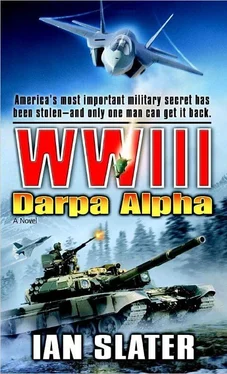“Holy shit!” someone yelled, the big Stallion rising higher and higher, popping flares, orange blossoms in a mad rain; then the Stallion descended once more.
“Marines!” Freeman shouted, to the accompaniment of rain drumming with such intensity against the Stallion that even the general had to shout in his command voice to be heard. “You’re marines. Half fish. Remember, weather is not neutral. Use this to your advantage. Use it! ” The red light was steady, ten seconds till touchdown.
In the cockpit pilot and copilot were sweating profusely. What they’d assumed to be frozen ground or marshland below was obscured by a furious rush of hail that was hitting the Stallion’s rotors and fuselage like a mad sower throwing bullets instead of grain.
“Brace!” came the pilot’s warning.
A jolt, and the off-center touchdown was of such force that against all intent, weapons flew from the hands of several marines only milliseconds before the huge helo’s front wheels took the full weight of men and matériel, the noise of the big rotors in the downpour sounding like an enormous car wash. Freeman, his team, and the forty marines of Bravo Company’s First Platoon ran down the ramp, its zebra-painted edges a blur as they deployed into waist-high reeds and a cold rush of unfamiliar odors. From somewhere on their left flank, how far away it was difficult to tell, there came the deafening noise of other rotors scything through the downpour and the sounds of battle already under way. The rain had reduced visibility to zero, the urgent throbbing and roar of Cobra gunships and marine Harriers mixing it up overhead adding to the ceaseless crackling of small-arms fire and the distinctive swoosh of air-defense missiles, heard but unseen overhead, all combining with the frantic screeching of thousands upon thousands of birds and other wildlife, creating an ear-ringing cacophony and confusion that was enough to unnerve even the most hardened veteran.
Their Stallion was lifting off for the 170-mile return journey to patch, repair, refuel, and repack for a second wave of 750 marines from Tibbet’s battalion, waiting aboard Yorktown . All of which meant it would be an hour and a half at the earliest before any reinforcements might arrive for the men deplaning and unslinging the Hummers, mortars, and other weapons that were vital to any offensive against the ABC complex.
A tremendous, ear-punching boom was followed by a huge, roiling orange-black ball of flame rising several hundred feet above them through the rain. Two Cobra gunships had collided. Their burning debris fell slowly through the downpour, momentarily illuminating a small wood on their left flank. To his dismay, Freeman saw snowy ground and ice-encrusted marsh ahead, a mass of ice-sheathed reeds looming and fleetingly turning orange in the fire’s light, the reeds, some instantly dried by the heat, rattling furiously in the explosion’s aftermath.
Beyond the marsh they could see the gray of rain and nothing more, no H-block or any other structure. The most they could hope for in that moment was that the marines of Bravo Company’s second and third platoons and the assault force’s four Stallion-ferried anti-tank Hummers and six light fast-attack vehicles had been put down close by. A quick GPS check by platoon leader Lieutenant Terry Chester confirmed that the Super Stallion had delivered his marines and the general’s SpecOps team to within a quarter mile of the LZ’s center, a prodigious feat of flying, given the atrocious weather.
“Down!” shouted Freeman upon hearing the peculiarly rushing, shuffling noise of incoming, the Russian 122 mm round exploding in the woods in a yellow crash and sending white-hot fragments singing and ripping into a small stand of trees, shrapnel whizzing into and out of the wood.
“I’m hit!” cried a marine.
“Corpsman!” shouted the platoon sergeant, but the marine medic was already there. The young marine who’d been struck in the head by wood splinters was bleeding profusely. Stunned, he sat up and looked at his M-16 with a puzzled expression. The corpsman shouted at him to keep his hands away from his face. Thick smoke almost completely obliterated the marsh directly ahead, only about sixty yards away. It looked as if swamp gas was rising until its whiteness suggested a smoke-making round had landed there.
“Keep your eyes open,” Freeman ordered unnecessarily, as everyone was straining to see, anxious to link up with fellow marines from Bravo Company on either flank, and simultaneously fearing the danger of blue on blue, what correspondents, such as Marte Price and her ilk, would call friendly fire.
“BTR, two o’clock!” yelled Aussie Lewis, crouching down by the wood, pointing at the vehicle’s presence no more than a hundred yards away. One of the most brutish of the Soviet-designed troop transports, the Bronetransporter was a huge, eight-wheeled armored personnel carrier, its two armor-lidded front eye slits, boatlike hull, sloping sides, and tortoiseshell-like top giving it the appearance of some lumbering, metallic reptile from another age. That, however, as Lieutenant Chester knew, was an illusion.
“Freeze!” he ordered. “Javelin only.”
The BTR, a type 60, Freeman thought, by the looks of it, would probably be carrying twelve troops inside, each soldier most likely armed with the new AKS-74U, a weapon that Freeman had chosen for himself. A shorter-barreled, folding-stock version of the AK-47, it was designed for easier use in the confined space that was the rear troop section. This meant the twelve Russian troops’ weapon would have a shorter range than most of the weaponry the marines carried. But he also knew the AK-74 had more whack per cartridge than most regular submachine guns.
By now, Freeman, like Chester, was wondering whether the Russians had spotted the platoon, both the general and Chester, in unconscious unison, training their binoculars on the enemy war wagon, Freeman quickly tapping the digital focus button for as sharp an image as possible through the curtain of rain. The BTR’s turret, with its heavy 14.5 mm and lighter coaxial 7.62 mm machine guns, was slewing left to right like a trap shooter unsure of which sector he should be watching.
“Amateurs,” Aussie told Freeman. “They don’t know where the hell they’re going. In panic mode — maybe here, maybe there.”
“Kegg?” called out Lieutenant Chester.
From long battle experience, Freeman’s vision, unlike that of Kegg and most of the marines, wasn’t held captive by the BTR. Instead he was scanning through a full 360 while taking care not to show himself above the reeds at the edge of the marsh that fringed this western sector of the vast lake. Mines were much less likely to be buried here because of the glutinous mud. He glimpsed a marine. It was Kegg, moving smartly forward with the Javelin anti-tank unit. But Freeman was more interested in looking beyond at the rising clouds of steamy vapor of the kind that he’d seen rising from the hot pools of New Zealand and Yellowstone. He could smell animal excrement, which struck him as odd, given that the ground was frozen. Perhaps he had stepped in a fresh pile of it.
Adjusting his throat mike and popping the digital earpiece from the matchbox-sized collar unit into his ear, the general made contact with Lieutenant Chester. Chester’s voice sounded scratchy, the platoon commander having just inhaled a pungent odor.
“Captain, something weird going on here. That vapor up ahead. You see any hot springs on the chart pre-op?”
“No, sir. Could be swamp gas.”
“Could be,” acknowledged Freeman, “but I’ve got a gut feeling we ought to stay put.”
Chester agreed, if for no other reason than he, like Colonel Tibbet and the others now under Freeman, knew that much of the general’s legendary reputation rested upon one simple fact: He was a meticulous observer. It was something first noted by Bob Norton, his old 2IC in Third Army. Norton, in a lecture at the Army Staff College, pointed out that most women could tell you the eye color of their close friends and acquaintances. Most men could not. Freeman could. There was something about the vapor he’d seen that bothered him. There was an eruption of marines’ small-arms fire off to their left, maybe 150 yards, at what was probably the first Russian they had seen in the marshes so far. The BTR’s turret immediately slewed in the direction of the firing, the BTR itself growling, exuding a coal black plume of diesel exhaust into the rain.
Читать дальше












